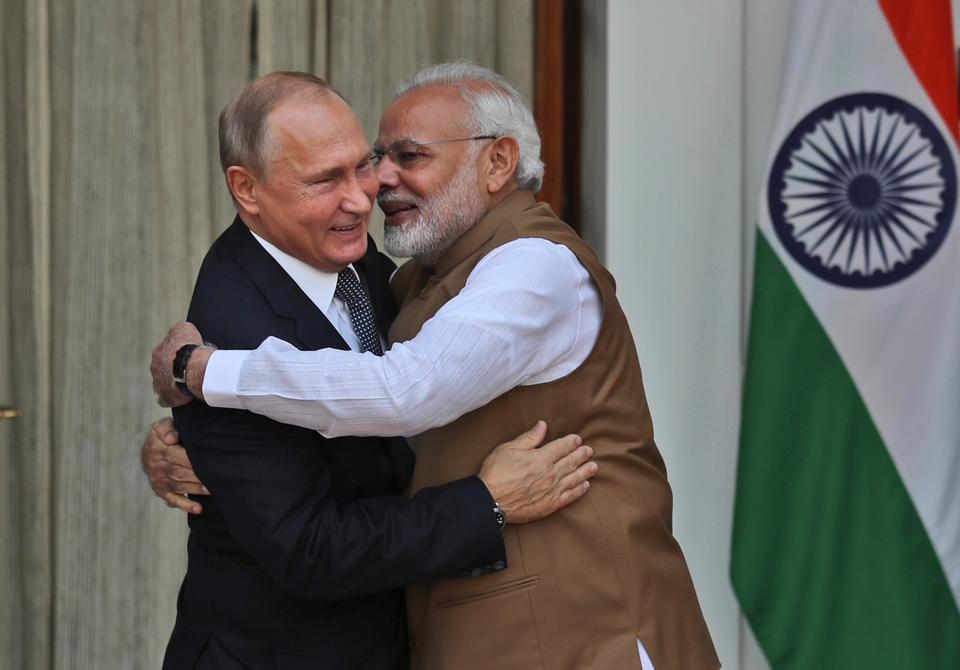As Washington mulls its options over ally New Delhi’s actions, experts say China is likely to sway US decision.
India’s decision to purchase the Russian S-400 surface-to-air missile defence system has escalated tensions among three nuclear-armed nations. It has also raised the possibility of punitive action by the US, which is reminiscent of Washington’s sanctions against its NATO ally Turkey.
Though the $5.43 billion deal to purchase five S-400 regiments dates back to October 2018, the first consignment of the military equipment was delivered only recently. This has drawn a sharp rebuke from the US, a long-time ally of India.
Dmitry Shugaev, director of the Russian Federal Service for Military-Technical Cooperation (FSMTC), announced the development earlier this month ahead of President Vladimir Putin’s tour of India in December.
India’s defence preparedness is mainly aimed at countering China along its eastern and northern frontiers, as well as arch-enemy Pakistan along its western borders.
India has been a fair-weather ally of Washington over the years. It is also part of a regional grouping – along with the US, Japan and Australia – called the Quad. This strategic security alliance was formed to counter China’s growing military influence in the Indian Ocean and Asia-Pacific regions. China has also deployed two S-400 squadrons to Tibet, a region directly across two Indian-controlled areas — Ladakh and Arunachal Pradesh — which is claimed by Beijing as its territory.
New Delhi recently deployed US-made weapons, such as Chinook helicopters, on its border with China to strengthen capabilities along the disputed Himalayan boundary.
However, the S-400 purchase has begun to blur the fundamental strategic partnership between Washington and New Delhi while raising questions on whether the US-India alliance faces the same fate as Turkey-US relations, which was also undermined by a similar S-400-triggered crisis, inviting US sanctions.
Common protocols with Russian weapons
On November 15, the US expressed ‘concern’ over India’s purchase of the Russian defence system with Pentagon spokesperson John Kirby, saying that they have been very clear on their reservations about India acquiring the system.
US Deputy Secretary of State Wendy Sherman also earlier stressed that any country deciding to use the S-400 missile system is ”dangerous.” But she hoped to resolve the differences between the US and India over the acquisition.
However, the current Indian government led by nationalist Prime Minister Narendra Modi is unlikely to renege on the deal despite warnings that the Russia weapons sale could invite US sanctions.
”India has made its stand clear that it needs the S-400 and will not go back on its contractual obligation towards the purchase, knowing fully well that US CAATSA (Countering America’s Adversaries Through Sanctions Act) sanctions could kick-in,” said retired Air Vice-Marshal Manmohan Bahadur of the Indian Air Force and a former Addl Director General at the policy think tank Centre for Air Power Studies.
According to Visne Korkmaz, Professor at the Nisantasi University, regional powers that act in delicate regions tend to diversify their relations. And India is one of those powers that cooperates with other regional actors in an effort to limit China’s expansion and counter a bloc against itself.
”This also had to do with taking measures in case of a US renouncement of containing China. And Russia stands out in this sense,” Korkmaz told TRT World, adding that India’s Russia strategy also aims to limit the deepening of Russia-Pakistan relations and the cooperation between Russia and China.
”It is very important for India to develop its capabilities. The S-400s are just one of the measures taken by New Delhi in the face of China’s increasing capabilities considering the air defence system. Here, S-400s are diversification tools.”
According to Manmohan, the Indian Air Force(IAF) has a robust and professional testing organisation called ASTE, which would have evaluated all systems on offer. The system might have considered that S-400s are suitable for their weaponry.


Comment here